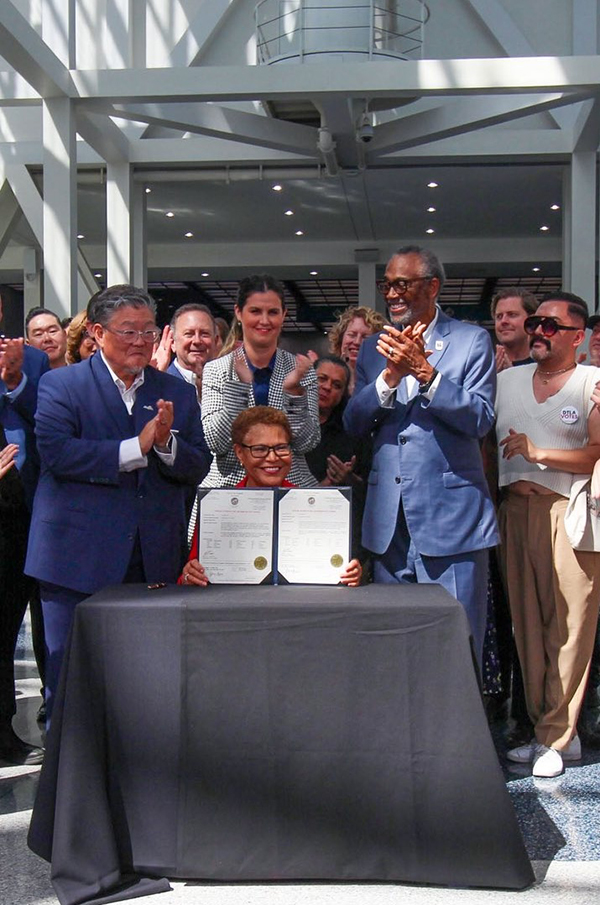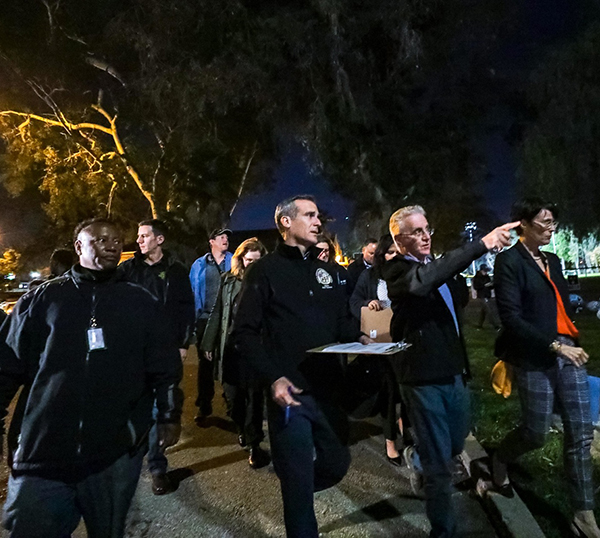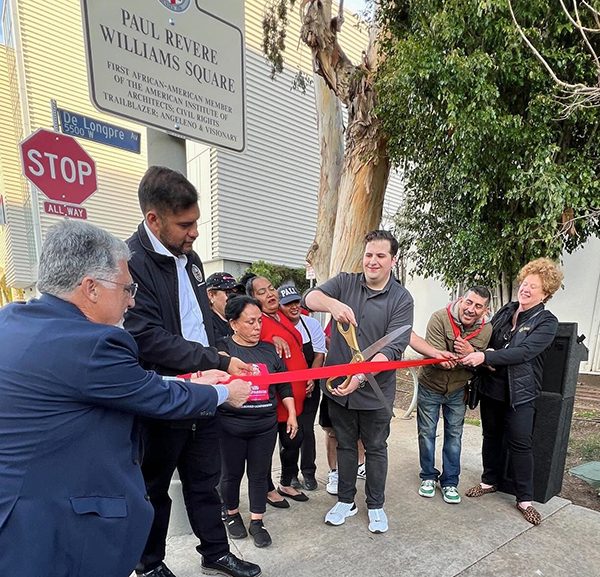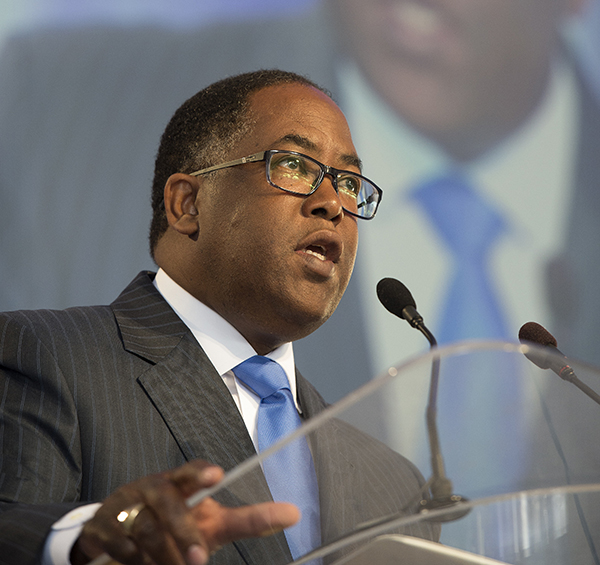Mayor signs off on Convention Center expansion project

Mayor Karen Bass signs paperwork formalizing plans for the Convention Center Expansion Project. Bass said the plans will support the downtown area’s ongoing revitalization.
Courtesy photo
Wave Wire Services
LOS ANGELES — Mayor Karen Bass gave final approval Sept. 24 to the Convention Center Expansion Project and announced new efforts that she said will support the downtown area’s ongoing revitalization in the immediate term during construction.
During a news conference inside the Convention Center’s West Hall, Bass said the $2.62 billion expansion is more than just another project, describing it as an investment for the city and the local economy. The expansion aims to bring more jobs to the downtown area and prepare the facility for the 2028 Olympic and Paralympic Games.
“It is our responsibility to do this in a way that first and foremost protects our fiscal level, and we’ll work in partnership with the City Council to implement cost-saving measures, efficiency, improvements and streamline our projects, which is most important to ensure our timing while we do everything to fast track this project in a responsible way,” Bass said.
With construction expected to begin in October, the mayor detailed some new actions that will be implemented while the project is underway:
• The Los Angeles Police Department will deploy foot patrols and trained bike officers in downtown neighborhoods to prevent crime.
• Trained mental health teams will be deployed to priority areas such as the Historic Core.
• City officials will advance plans and fast-track key permits for downtown developments.
• Los Angeles will implement a coordinated effort to remove graffiti, clear trash, and beautify major streets and public spaces.
City Councilman Curren Price, who represents the Ninth Council District, encompassing South L.A. neighborhoods, has been a stout advocate for the project since talks began about a decade ago, and called the expansion a new beginning for the downtown area.
Assemblyman Mark Gonzalez, D-Los Angeles, also a proponent of the expansion, described the milestone as a “promise, a promise that the city will not shrink at a challenge but thrive with purpose.”
More than 30 business leaders and downtown resident joined Bass to show their support. Among them was Rob Nothoff, deputy chief of staff for the Los Angeles County Federation of Labor, an organization that represents 800,000 union members across the L.A. region.
“This is an investment in our future. This is an investment in workers,” Nothoff said.
He said the project will create thousands of new, permanent union jobs for L.A. residents.
“This project has a 50% local paradigm, meaning that Angelenos would be the ones who build it,” he added.
Leslie Ridings, co-founder of the Downtown Los Angeles Residents Association, hailed the project as well, noting that it will serve as a catalyst to make downtown safer, stronger and more vibrant for some 90,000 residents, workers and visitors in the area.
“This is just the first step to show the world the very best of Los Angeles,” Ridings said. “Los Angeles comes together in the heart of downtown Los Angeles.”
The City Council approved the expansion project in an 11-2 vote Sept. 19 despite concerns of rising costs and potential risks to the city’s finances and services.
Council members Katy Yaroslavsky and Nithya Raman voted against the project, and their colleagues Monica Rodriguez and Bob Blumenfield were absent.
The expansion will connect the site’s West Hall with the South Hall, adding 190,000 square feet of exhibit hall space, and nearly 40,000 square feet of meeting room space, and 95,000 square feet for a multi-service room. The council also authorized issuing $990 million in bonds to fund the project — with the debt service paid through 2058.
City officials expect the project to generate significant economic impact by adding nearly 9,000 union jobs and 1,600 apprenticeships, $1.8 billion in additional local business sales, $103 million in tax revenue for city services and 3.6 million visitors annually.
The Convention Center is slated to be the venue for fencing, taekwondo, judo, wrestling and table tennis for the 2028 Olympics and wheelchair fencing, taekwondo, judo, boccia and table tennis for the 2028 Paralympics.
The city will finance $3.06 billion for the project, after adding the capitalized interest and bond issuance cost, according to City Administrative Officer Matt Szabo. Approximately $566 million will be set aside for “city-retained costs” to control overages, cover the impact of tariffs on construction materials, electrical service delivery and other potential risks.
The project will have an average annual general fund impact of about $89 million. In the early years the debt service will be higher.
The project will be built through a so-called “phased delivery” with completion slated for 2029. Work would be paused during the 2028 Games. The facility must be “Olympic ready” by March 31, 2028, or the city could be on the hook for additional costs if competitions need to be relocated.
The project also had its critics, such as the Howard Jarvis Taxpayer Association.
“The City Council is threatening to saddle L.A. taxpayers with decades of debt payments to pay for a Convention Center expansion that they’re rushing to approve in time for the Olympics. It’s completely unfair to the taxpayers to put this unaffordable vanity project ahead of all the important priorities placing demands on the city’s budget,” the association said in a statement.
City Controller Kenneth Mejia is also against the project.
“As long as the city fails to fundamentally change the way it handles its finances and continues to inadequately fund city services for our nearly four million residents, we cannot recommend taking on this project at this time,” he said.
City Council President Marqueece Harris-Dawson has called the project “perhaps one of the biggest decisions that the city made.”
“It is a decision that, if it goes in one direction, has at least 30-year implications on the budget and beyond. Either way, this decision has an impact on our city for generations to come,” Harris-Dawson said previously.
Jose Herrera is a reporter for City News Service.





